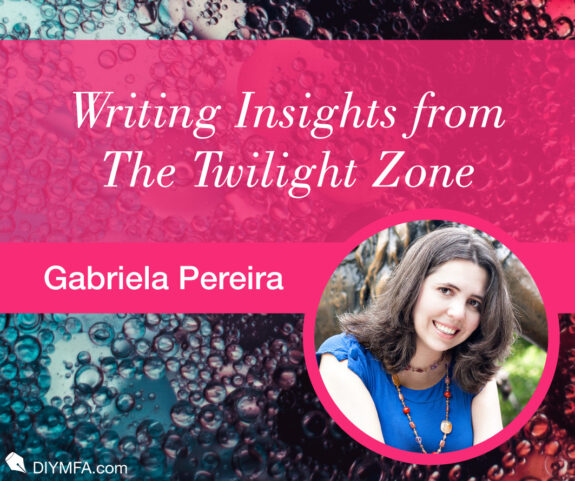You may not know this about me, but I am a die-hard Twilight Zone fan. The show represents some of the finest writing in television and I especially love that it’s kid-friendly so I can watch with the nerdlings. Sure, a couple of episodes might be duds, but what show doesn’t hit the occasional bump in the road? In the case of The Twilight Zone, while you might get a few misses now and then, many (if not most) of the episodes are spectacular.
Here are some of my favorites:
“To Serve Man” Benevolent aliens come to earth and fix all our problems. What’s not to love, right? But things aren’t exactly what they seem. As a total word nerd, the wordplay and double-entendre in this episode tickles me pink. Not sure what I mean? I can’t tell you more without giving away the twist, so you’ll have to watch the episode. Let’s just say the title has special significance.
“Time Enough at Last” It’s about books! The poor protagonist is antagonized by everyone in his life and all he wants to do is read. Every book lover can relate to this. After all, how many times in your life have you wanted nothing more than to curl up with a good book and life just kept getting in the way? Plus, I can’t get over the twist at the end. I’ve seen this episode dozens of times and that final sequence does me in. Every. Single. Time.
“Will the Real Martian Please Stand Up” This episode is like a closed room Agatha Christie novel with a sci-fi twist. A bunch of people are stuck at a roadside diner during a snowstorm. One of them is supposedly an alien, but no one knows who and the alien’s not giving it up either. Suspicions rise in typical Twilight Zone fashion, with us finally learning the truth at the end. My favorite part about this episode? Watching my kids watch it and seeing the look on their faces when we got to the twist. Little Man was so excited, he practically fell out of his chair.
Key Insights Writers Can Draw from The Twilight Zone
So, why all this talk about The Twilight Zone? Why do we care? When I watch TV I’m not just looking to it for entertainment, I’m also inspecting the writing. I want to try to get at the heart of how the story is crafted. Here are some key insights I’ve gleaned from watching The Twilight Zone.
1) Stay True to Your Voice
One of the things that makes The Twilight Zone so engaging is that the show has a consistent voice. For starters, there’s Rod Serling who is not only the creator but also the narrator, the literal voice of the show. But, Rod Serling aside, there still is a consistent vibe to every episode, such that when we’re watching, it feels undeniably like The Twilight Zone and can’t be mistaken for anything else.
As writers, we can play with our voice to some degree, but if we learn anything from The Twilight Zone it’s that honing our voice and keeping it consistent is key to making story magic. Yes, we can modulate our voice now and again, but we want to retain that core essence, that special something that makes our stories our stories.
2) It’s Okay to Explore Many Genres and Formats
Part of what makes The Twilight Zone interesting is that it doesn’t just stick to a single genre. There might be aliens and space travel in one story while the next one might be a western or a historical narrative. Others are set in the present day (i.e., the 1960s).
The show also explores many different storytelling styles and formats. Some episodes are character-focused and not much really happens in terms of plot. Other episodes are all about the plot twist at the end. On a similar note, the use of dialogue varies across the different episodes, with some being very talky and dialogue-heavy, and others (like “Two” and “The Invaders”) having no dialogue whatsoever.
We can take a page from The Twilight Zone playbook and change things up a little bit in our writing. This is especially important when we get stuck in a creative rut. In those cases, sometimes the best solution is to break away from our usual fare and try something completely different, like a new genre or format. We can even blend genres together to create something completely new.
3) If You Want to Add a Twist, You Have to Earn It
If I were to sum up The Twilight Zone in only one sentence, I would put it like this: It’s about regular people living regular lives, only there’s something weird in every episode and there’s usually a twist at the end. There’s always that emotional punchline, that moment at the end where everything seems to turn on its head. The best Twilight Zone episodes are ones where the twist is earned, where the story has set the audience up for that gut-plunging moment.
There’s one particular episode—”It’s a Good Life”—where, in my opinion, the twist comes too soon. It happens right up front in Rod Serling’s introduction. I suppose the goal for that reveal is to surprise the audience from the start, but for me it makes the rest of the episode plod along without much purpose and the ending feels a little bit blah. If the reveal had come later, like during the television gathering, I think it would have made the story all the more terrifying. In my mind, this episode is an example of a twist that wasn’t earned.
This is something we should always keep in mind in our own writing. When we want to create a twist in our story, we need to make sure the narrative has earned that element. As my friend and colleague Steven James once told me: “A twist must be surprising but also inevitable.” This means that the audience can’t see the twist coming, but when it happens, it feels like the story could not have gone any other way.
4) Go All-In
One of the things I so admire about Rod Serling is that he not only created the show, but he also wrote many of the episodes (92 in total) and narrated all of them. Yes, the sheer volume of episodes did eventually lead to burnout, but there’s still something admirable about being so dedicated to a project that you go all-in.
As writers, we build stories and entire worlds on the page, and these are inhabited by characters that feel real to us. These stories, worlds, and characters also feel real to our readers. To create this effect, we need to go all-in. Yes, we need to keep it reasonable (to avoid burnout and honor other aspects of our lives) but we still have to commit. Even if that commitment is only a small slice of our life, in those moments we do reserve for our writing, we have to put in everything we’ve got. This is how we breathe life into our stories.
Until next time, keep writing and keep being awesome!

P.S. For more info on Gabriela Pereira, the founder and instigator of DIY MFA, check out her profile page.







